Form 0920-24CB Post Exposure Survey _English
[NCCDPHP] Evaluation of a Prostate Cancer Decision Aid
Attachment 07f_Post-Exposure Survey_Online_English
Post-exposure survey
OMB: 0920-1438
Form approved
OMB # 0920-####
Exp. date MM/DD/YYYY
ATTACHMENT 7f
Post-Exposure Survey:
Online, English
WEB SURVEY APPEARANCE |
Optimization for best viewing and ease of use on multiple devices (desktop, laptop, tablet, smartphone) |
Header Text: ADD HERE |
Footer Text: If you have any questions about the study, please email our study coordinator at [email protected] |
Logo: |
Termination page: Thank you for your time and interest. You do not qualify for this survey at this time. |
Prompt for required questions. Note, All questions should be programmed as soft prompt unless specified as “required”: Please complete all the questions on this page before moving on. |
PROMPT FOR ALL OTHER QUESTIONS IF RESPONDENT TRIES TO SKIP You have not answered all the questions on this page. Please consider responding to all questions. If you are choosing not to answer a question(s), click next. |
Survey Completion text: Thank you for completing this survey. If you have additional questions about the study, please email our study coordinator at [email protected] |
Sample variables: [Clinic] Dr. [Name] [EDUMAT] [date] – date of scheduled visit with Doctor, in final variables |
Imported Sample Variables
CLINIC
IMPORTED SAMPLE VARIABLE: Clinic Name
[TEXT BOX]
NAME
IMPORTED SAMPLE VARIABLE: Name
[TEXT BOX]
EDUMAT
IMPORTED SAMPLE VARIABLE: EDUMAT
1 1
2 2
DATE
IMPORTED SAMPLE VARIABLE: Date
Informed Consent
[ASK ALL]
LANG.
In what language would you like to complete this survey?
¿En qué idioma le gustaría completar esta encuesta?
01 English
02 Español
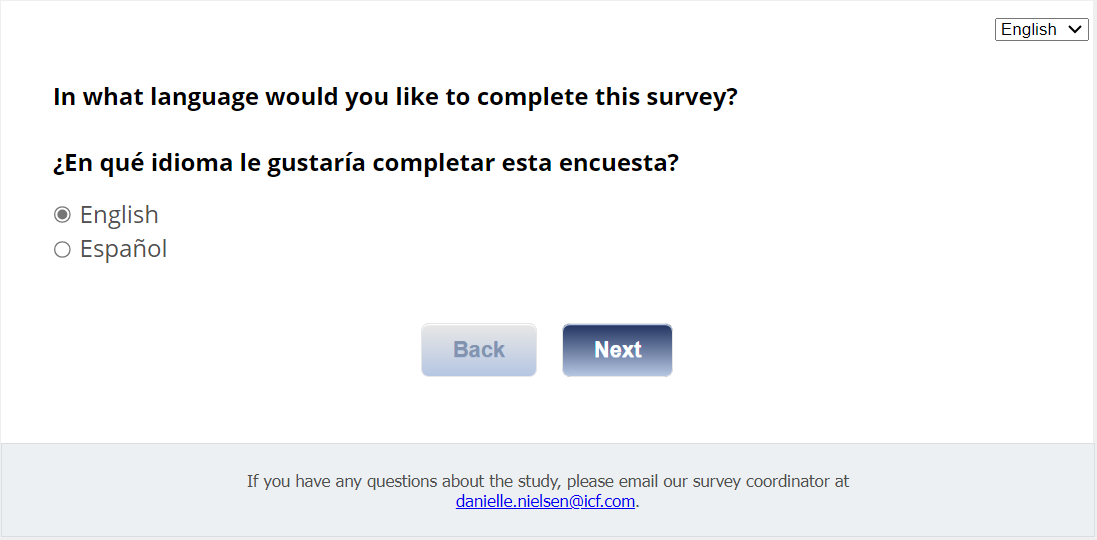
[ASK ALL]
[required]
C1CONSENT.
You are being asked to participate in this study because you receive care at [CLINIC] and are eligible for prostate cancer screening. The purpose of this survey is to gather information about your prostate cancer screening history and decision making. If you complete this survey, you will receive a $25 gift code.
Who is sending this survey? ICF is a consulting firm that is working with the Division of Cancer Prevention and Control (DCPC) at the Centers for Disease Control and Prevention (CDC) to evaluate different prostate cancer screening decision aids and their ability to help men aged 55-69 years make a decision whether to get a prostate-specific antigen (PSA) test. A PSA test is a blood test that measures the level of PSA in the blood. PSA is a substance made by the prostate.
How long will it take? This survey will take no longer than 20 minutes. Your participation in this study is 100% voluntary which means you can choose whether or not you want to take part in this study.
What are the risks and benefits of doing the survey? As a participant in our study, there is a minimal risk related to your privacy and/or confidentiality, but steps have been taken to remove your personal information so that you cannot be identified. Only members of the research team will have access to study information. Remember, you are free to choose not to participate in this study. You are also free to leave the study at any time. Leaving the study will not interfere with your care, payment for your health care, or your eligibility for health care benefits.
Is there a cost associated with the study? There are no costs to you for participating in this study.
What will happen next? The study team may contact you by text, email, or phone to share information or invite you to respond to other surveys or interviews. All requests for information are voluntary. The purpose and topic of each request for information will be shared with you so you can choose whether you want to participate. Your choice to participate or not participate in future requests will not interfere with your care at the clinic.
How will my information be shared outside of the study? Your personal responses will not be shared outside of the study. Summaries of survey results that are not linked to your name will be shared with CDC and/or may be published in a professional journal.
Who do I call about problems or questions? If you have questions about or concerns about your participation in this project, please contact the ICF project manager – Danielle Nielsen at [email protected]. For questions regarding your rights as a study participant, you can contact ICF’s Institutional Review Board (IRB) representative Christine Walrath at (646) 695-8154 or [email protected]. Further, you may contact the CDC point of contact, [NAME] for more information about this study and how CDC may use the results.
If you agree to participate in this study, please click “Begin Survey.”
If you do not agree to participate, please click, “I decline.”
01 Begin survey
02 I decline
[TERMINATE IF CONSENT=02]
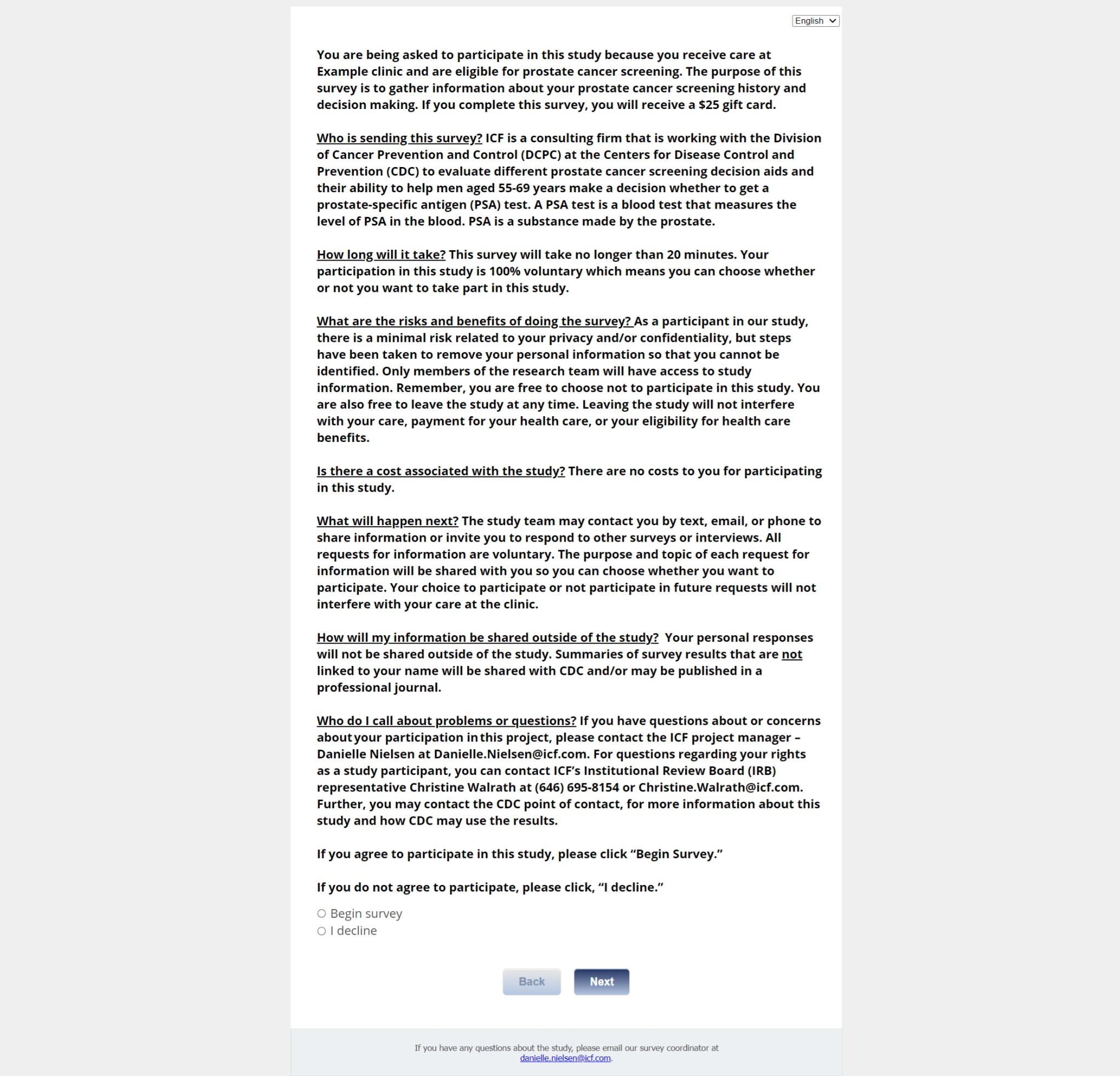
Section 1: Prostate Cancer Knowledge
[ASK ALL]
Q19W2
In this section, we would like to get a sense of your prostate cancer knowledge. If you are unsure how to answer a question, please select the “Not sure” response.
The prostate gland is a reproductive organ located below the bladder.
01 True
02 False
03 Not sure
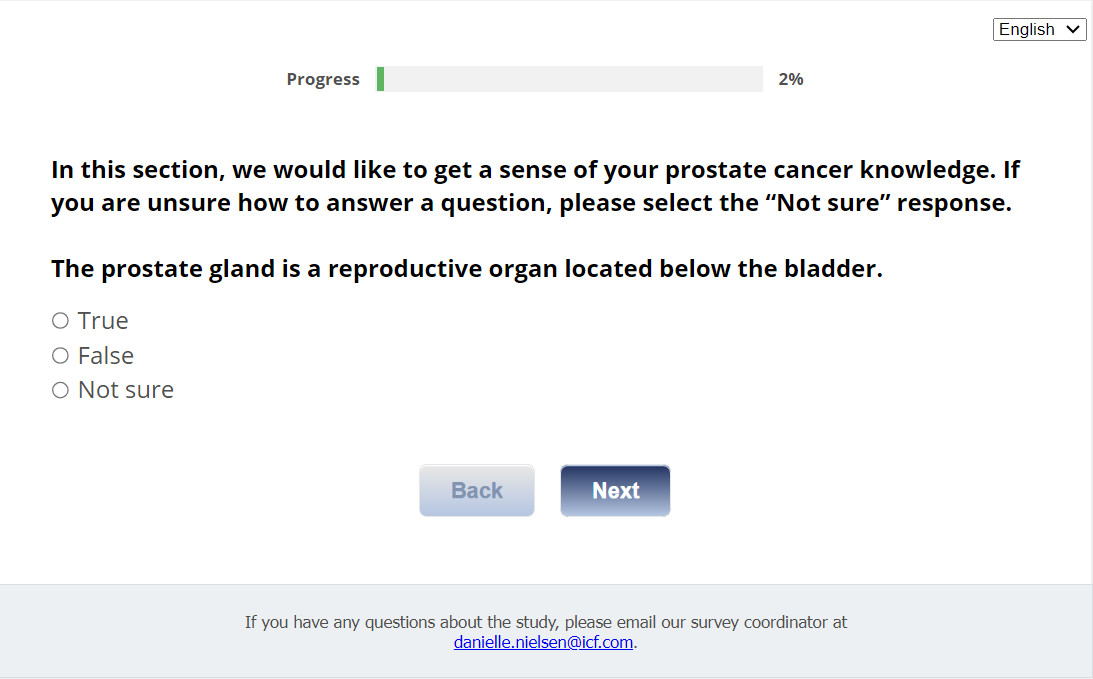
[ASK ALL]
Q19aW2
The prostate gland makes some of the fluid that’s part of semen.
01 True
02 False
03 Not sure
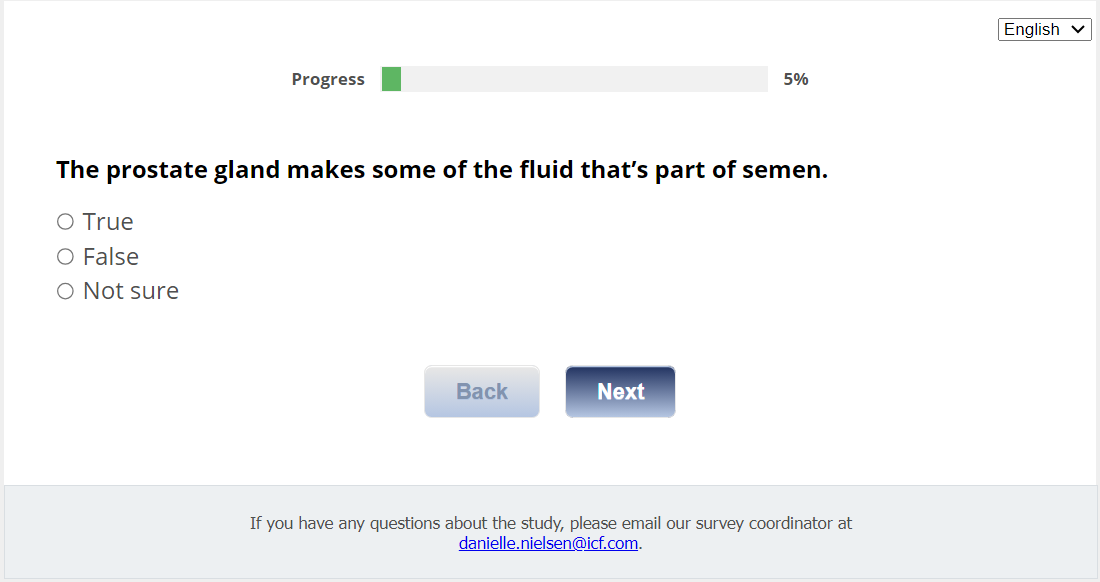
Risk Factors
[ASK ALL]
Q20W2
Older men are more likely to get prostate cancer.
01 True
02 False
03 Not sure
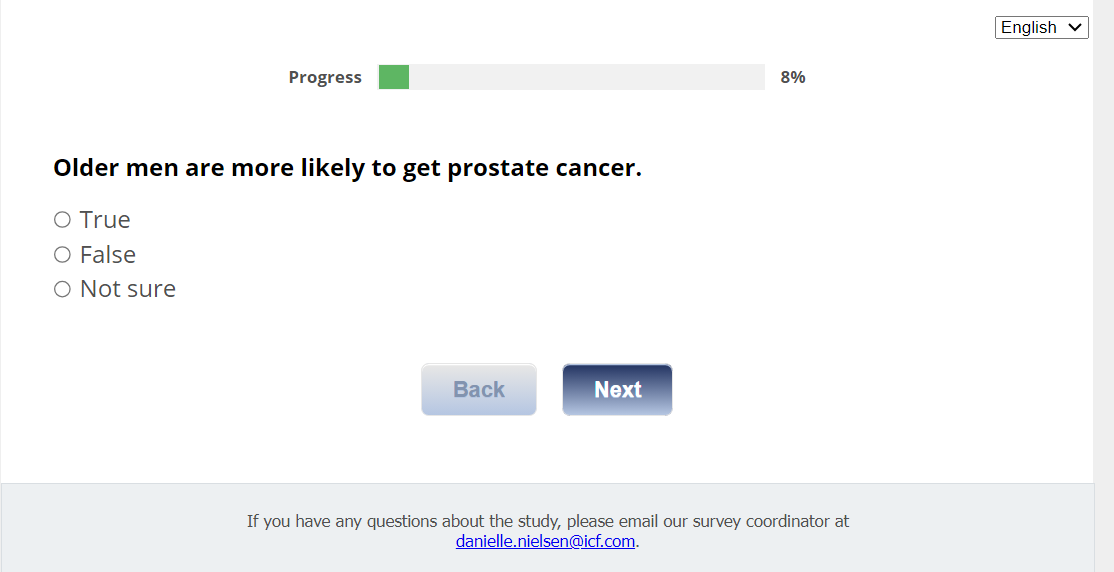
[ASK ALL]
Q21W2
More Black or African American men are diagnosed with prostate cancer than White men.
01 True
02 False
03 Not sure
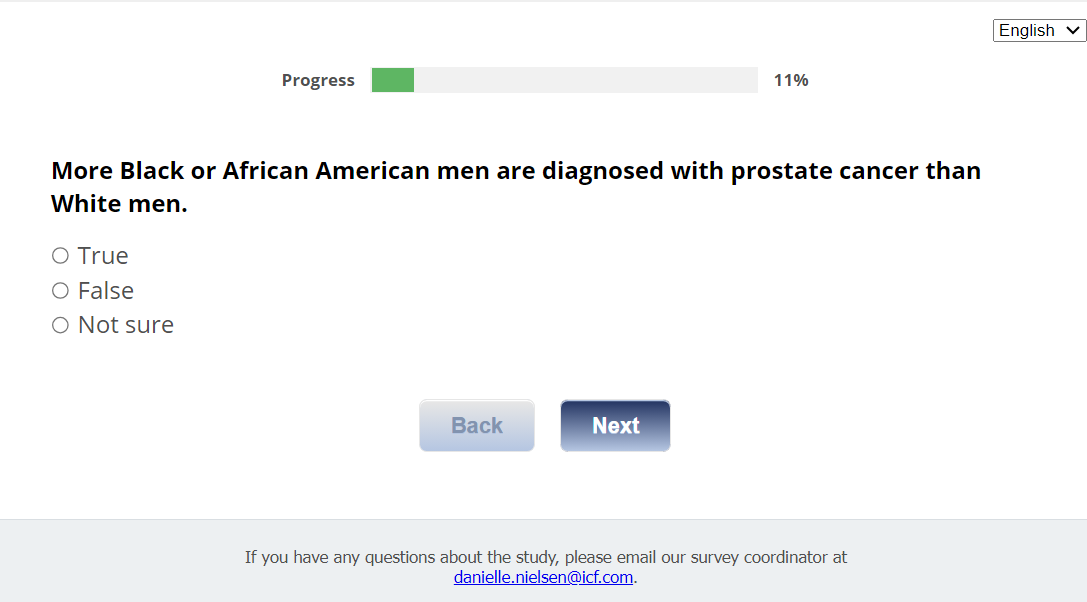
[ASK ALL]
Q22W2
Men who have fathers or brothers with prostate cancer are more likely to get prostate cancer than those who do not.
01 True
02 False
03 Not sure
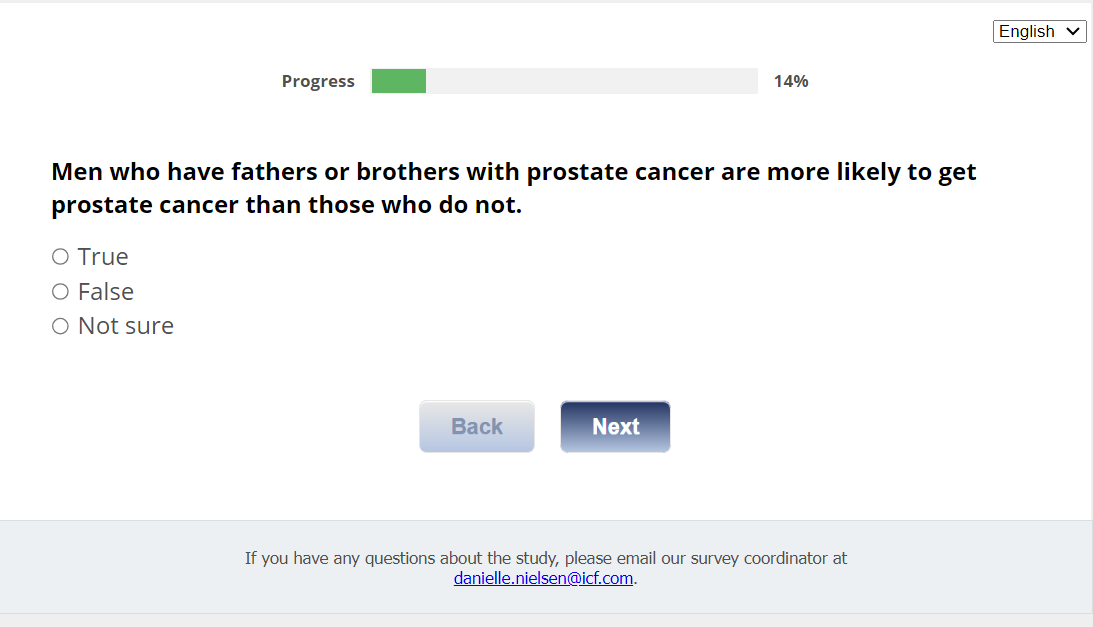
[ASK ALL]
Q23W2.
Who do you think is more likely to get prostate cancer?
01 White men
02 Black or African American men
03 Hispanic or Latino men
04 Asian men
05 Race or ethnicity is not a factor
97 Not sure
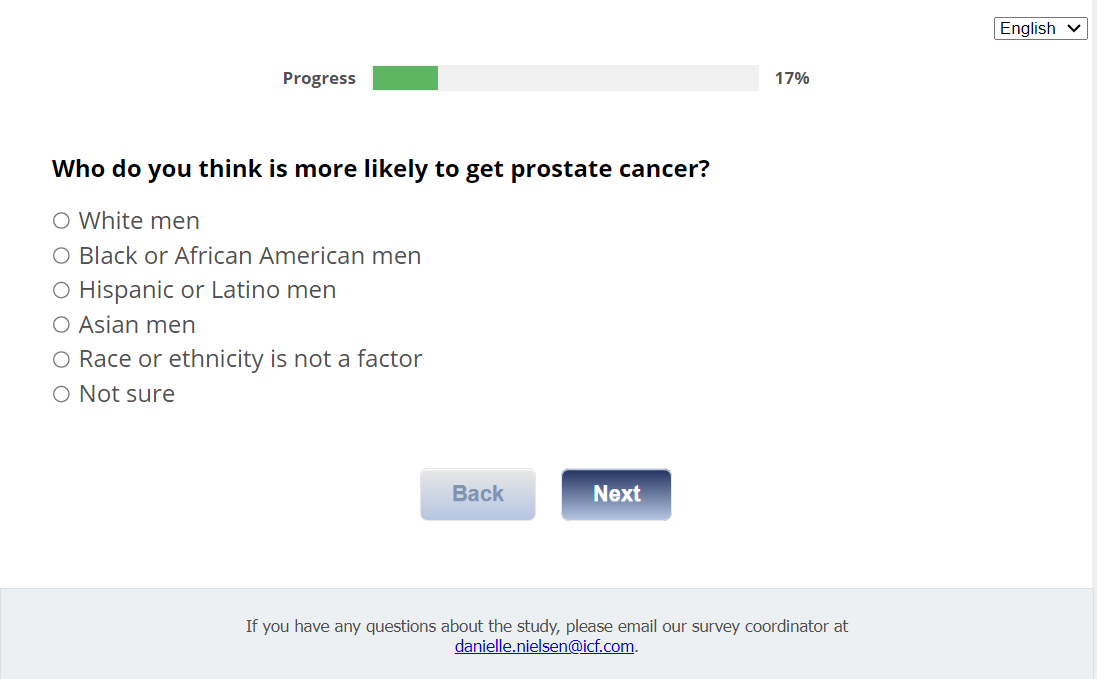
[ASK ALL]
Q24W2.
Who do you think is more likely to get prostate cancer?
01 A man whose father has had prostate cancer
02 A man whose father has not had prostate cancer
03 It doesn’t make any difference
97 Not sure
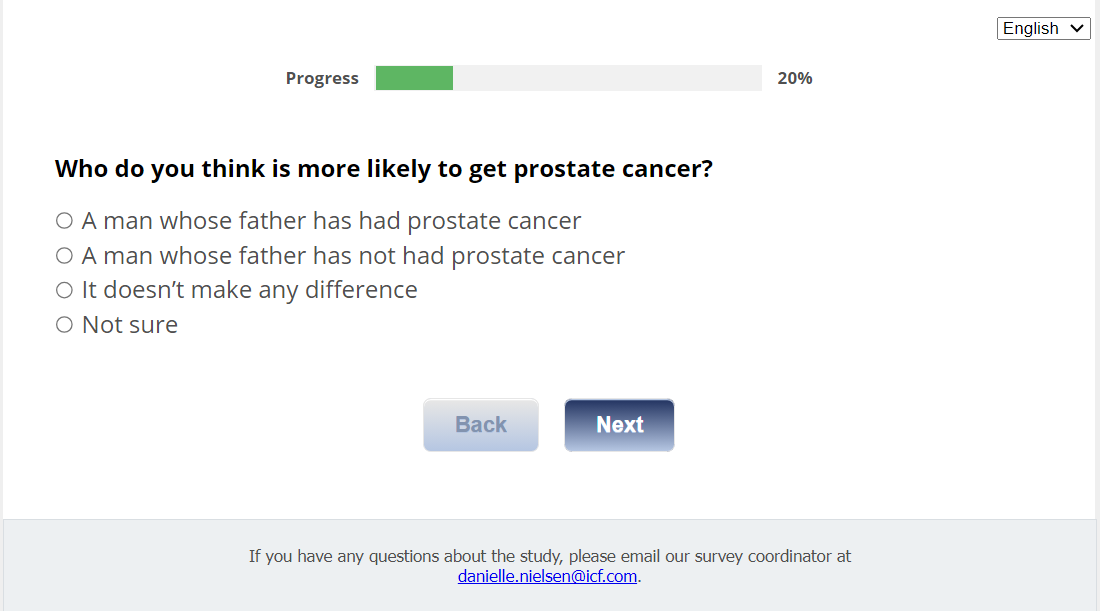
Screening
[ASK ALL]
Q25W2.
A prostate-specific antigen (PSA) blood test can be done to check for prostate cancer.
01 True
02 False
97 Not sure
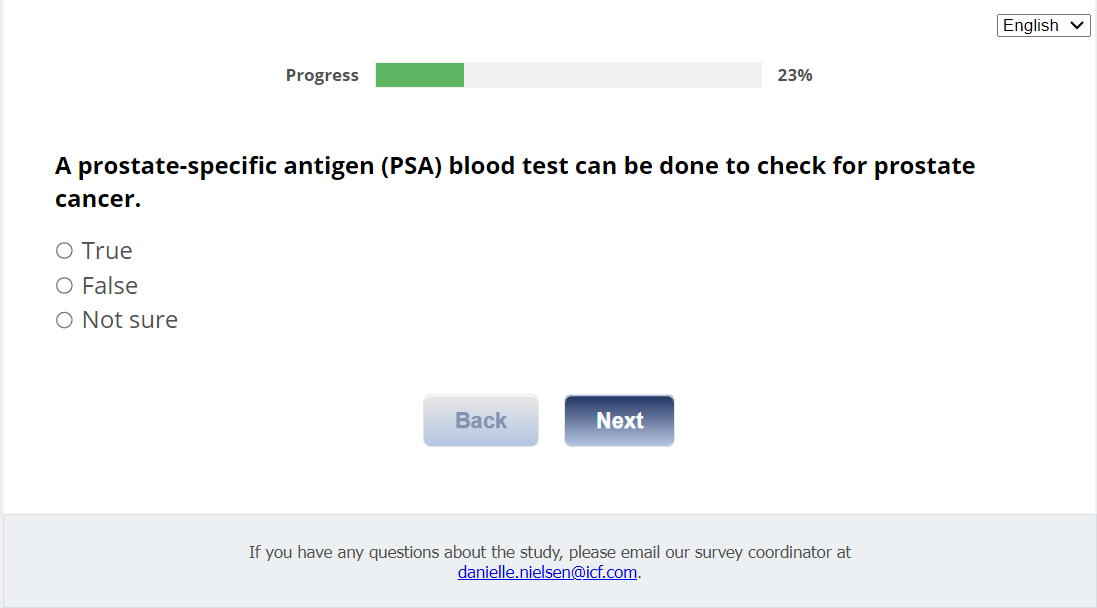
[ASK ALL]
Q26W2.
A digital rectal exam or DRE can be done to check for prostate cancer.
01 True
02 False
97 Not sure
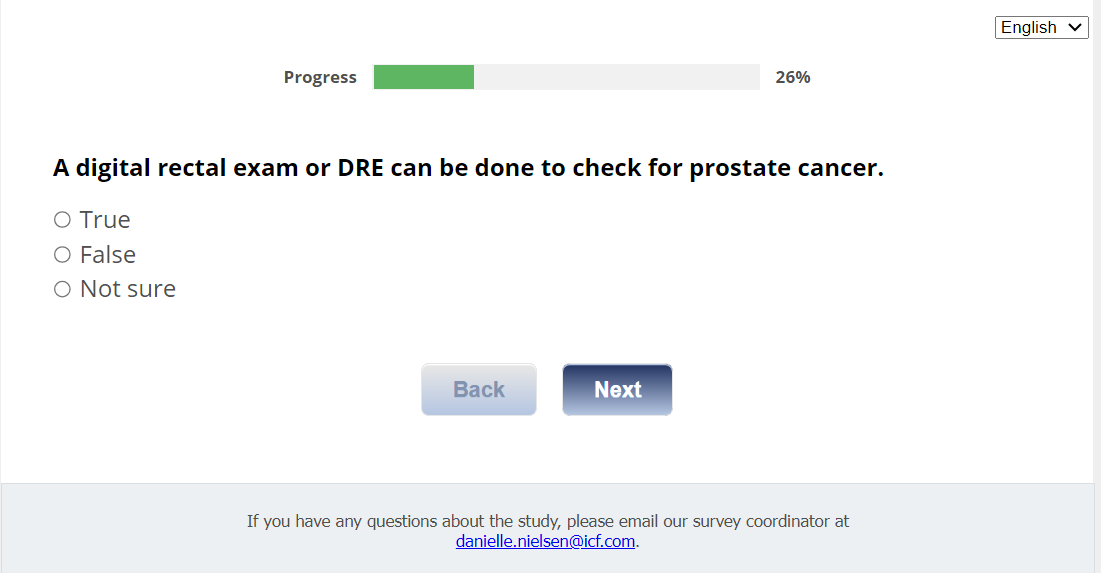
[ASK ALL]
Q27W2.
The only way a man can know for sure if he has prostate cancer is to have a prostate biopsy.
01 True
02 False
97 Not sure
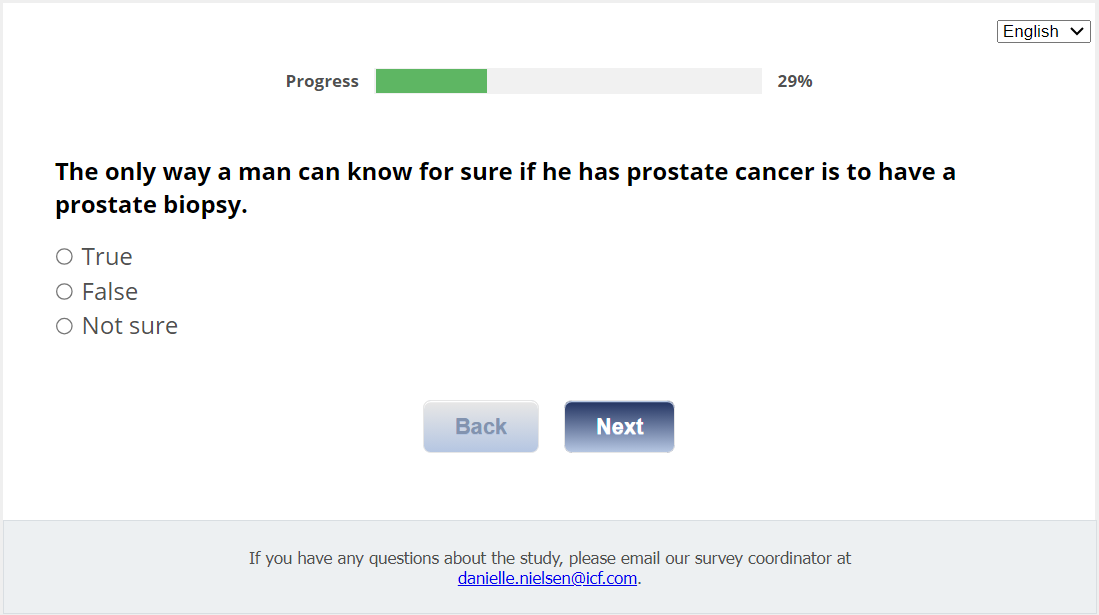
[ASK ALL]
Q28W2.
A prostate biopsy is when a blood test is used to check for proteins in the blood.
01 True
02 False
97 Not sure
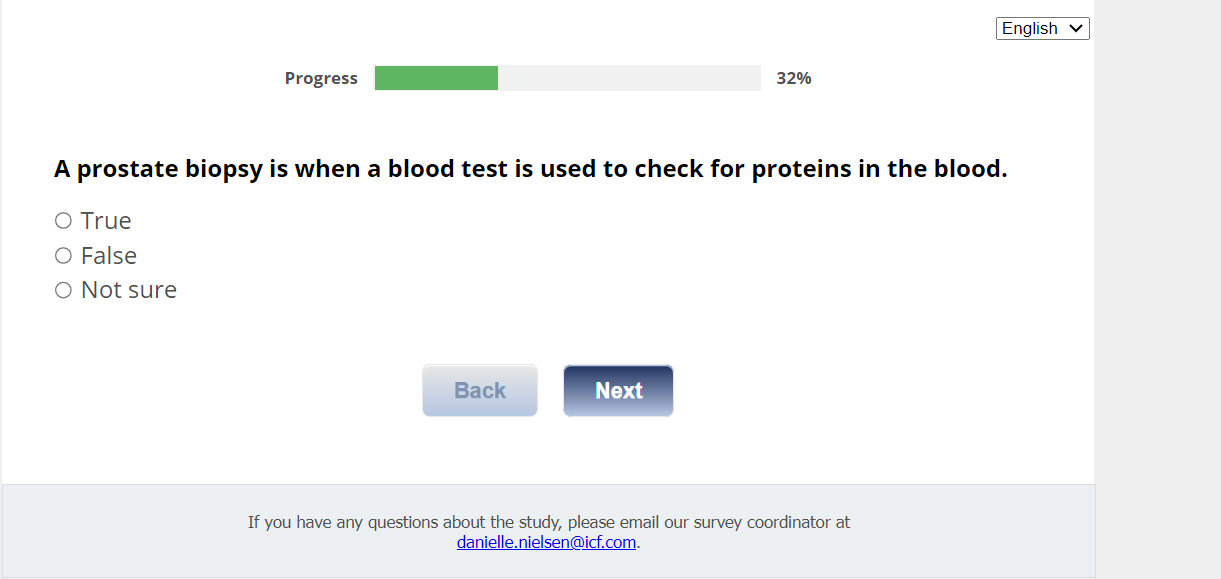
[ASK ALL]
Q29W2.
Neither the PSA nor DRE are 100% accurate.
01 True
02 False
97 Not sure
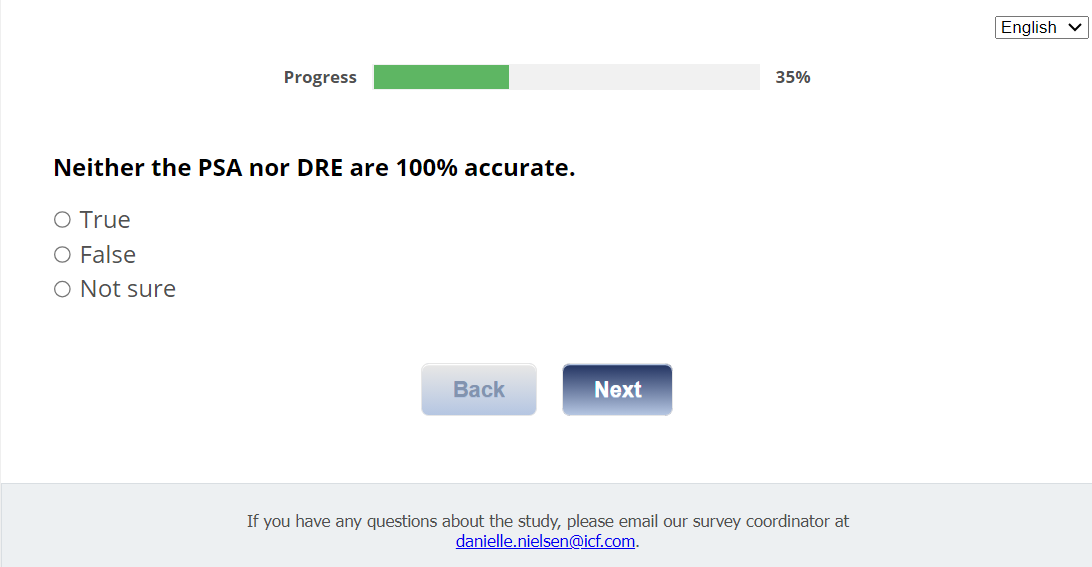
Warning Signs
[ASK ALL]
Q30.
A man can have prostate cancer and have no symptoms.
01 True
02 False
97 Not sure
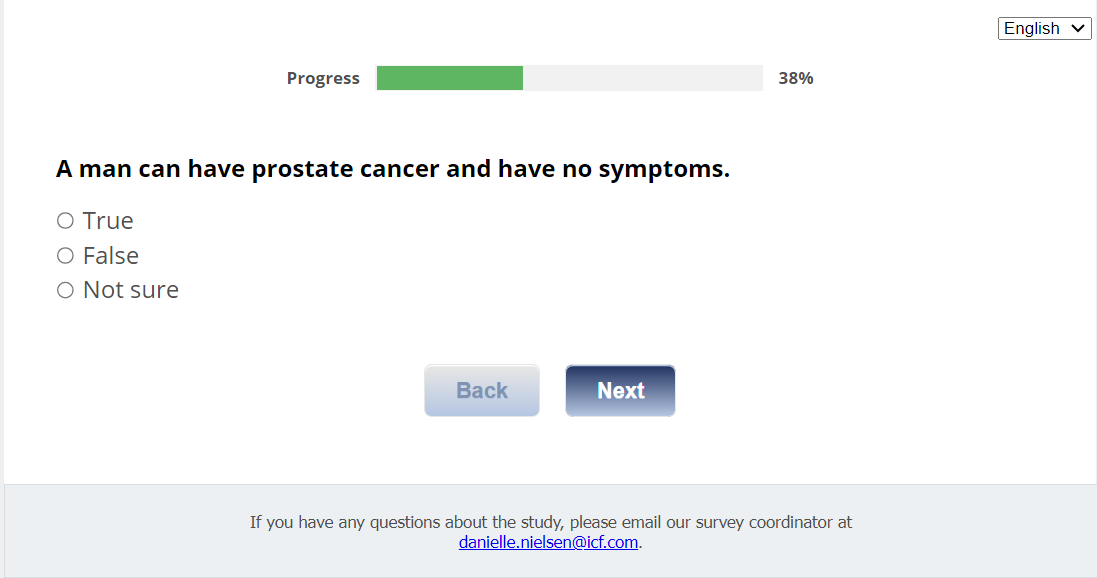
Section 2: Decisional Conflict
[ASK ALL]
Q36W2.
As it relates to prostate cancer screening, please indicate your agreement with each statement, using either strongly agree, agree, neither, disagree, or strongly disagree.
|
01 Strongly Agree |
02 Agree |
03 Neither |
04 Disagree |
05 Strongly Disagree |
Q36aW2. I know which prostate cancer screening options are available to me. |
|
|
|
|
|
Q36bW2. I know the benefits of each option. |
|
|
|
|
|
Q36cW2. I know the risks and side effects of each option. |
|
|
|
|
|
Q36dW2. I am clear about which benefits matter most to me. |
|
|
|
|
|
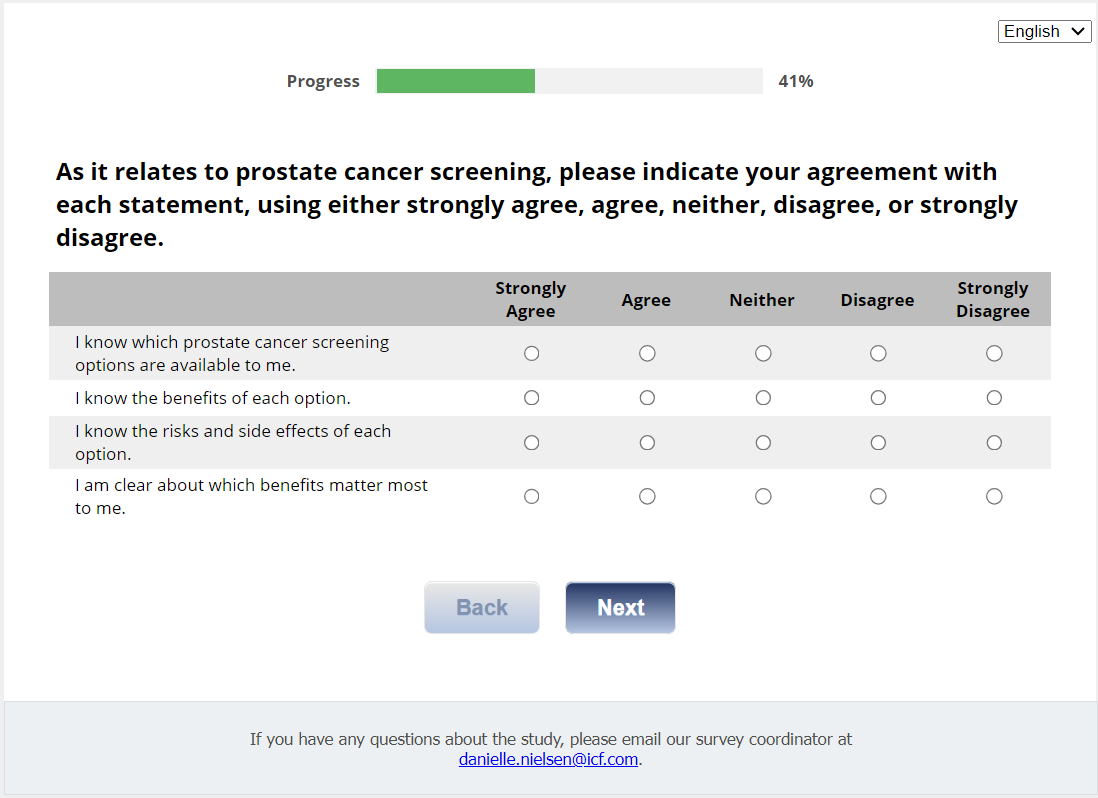
[ASK ALL]
Q36W2e_h.
Relating to prostate cancer screening,
|
01 Strongly Agree |
02 Agree |
03 Neither |
04 Disagree |
05 Strongly Disagree |
Q36eW2. I am clear about which risks and side effects matter most. |
|
|
|
|
|
Q31fW2. I am clear about which is more important to me (the benefits or the risks and side effects). |
|
|
|
|
|
Q36gW2. I have enough support from others to make a choice about prostate cancer screening. |
|
|
|
|
|
Q36hW2. I am choosing without pressure from others. |
|
|
|
|
|
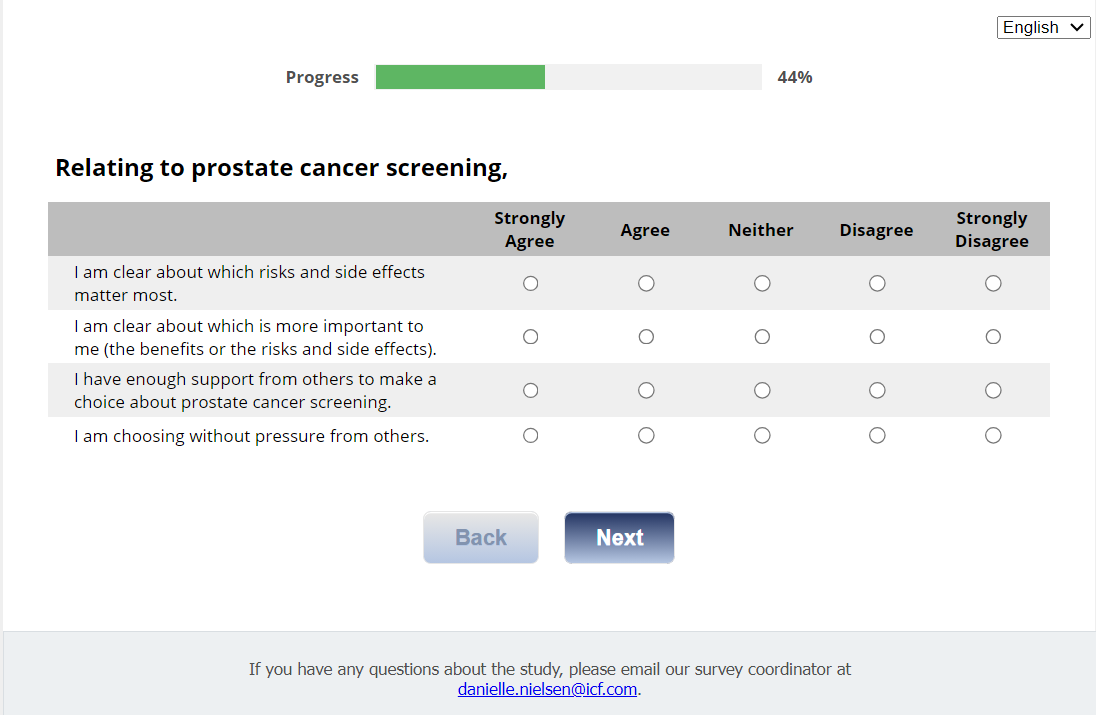
[ASK ALL]
Q36W2i_l.
Relating to prostate cancer screening,
|
01 Strongly Agree |
02 Agree |
03 Neither |
04 Disagree |
05 Strongly Disagree |
Q36iW2. I have enough advice to make a choice. |
|
|
|
|
|
Q36jW2. I am clear about the best choice for me. |
|
|
|
|
|
Q36kW2. I feel sure about what to choose. |
|
|
|
|
|
Q36LW2. This decision is easy for me to make. |
|
|
|
|
|
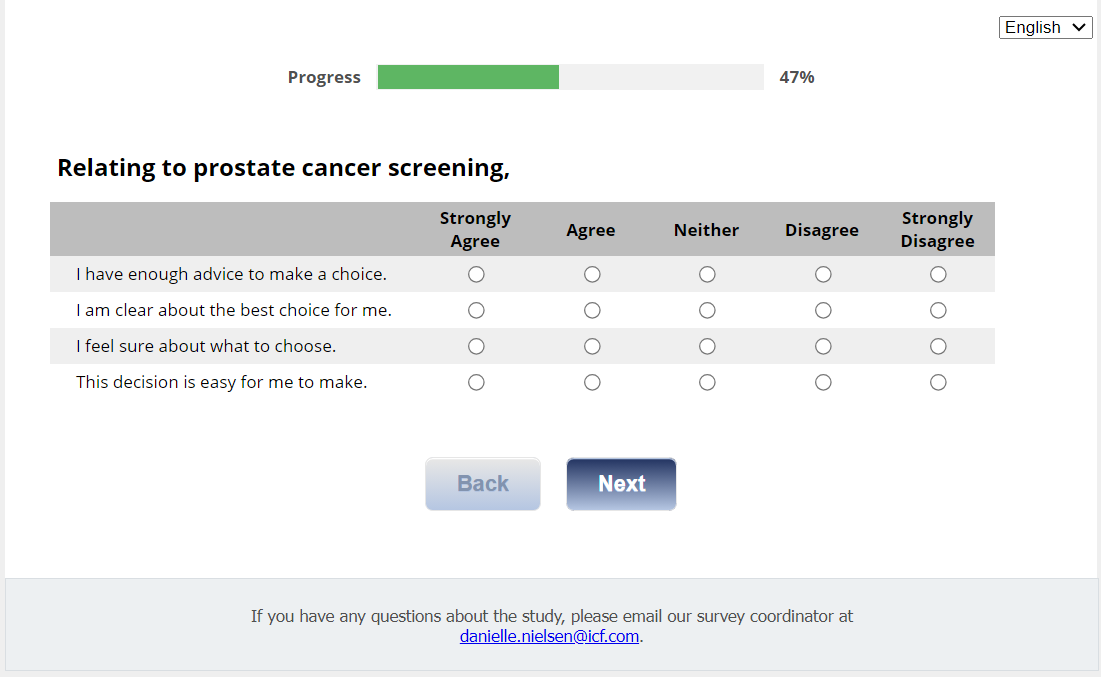
[ASK ALL]
Q36W2m_p.
Relating to prostate cancer screening,
|
01 Strongly Agree |
02 Agree |
03 Neither |
04 Disagree |
05 Strongly Disagree |
Q36mW2. I feel I have made an informed choice. |
|
|
|
|
|
Q36nW2. My decision shows what is important to me. |
|
|
|
|
|
Q36oW2. I expect to stick with my decision. |
|
|
|
|
|
Q36pW2. I am satisfied with my decision. |
|
|
|
|
|
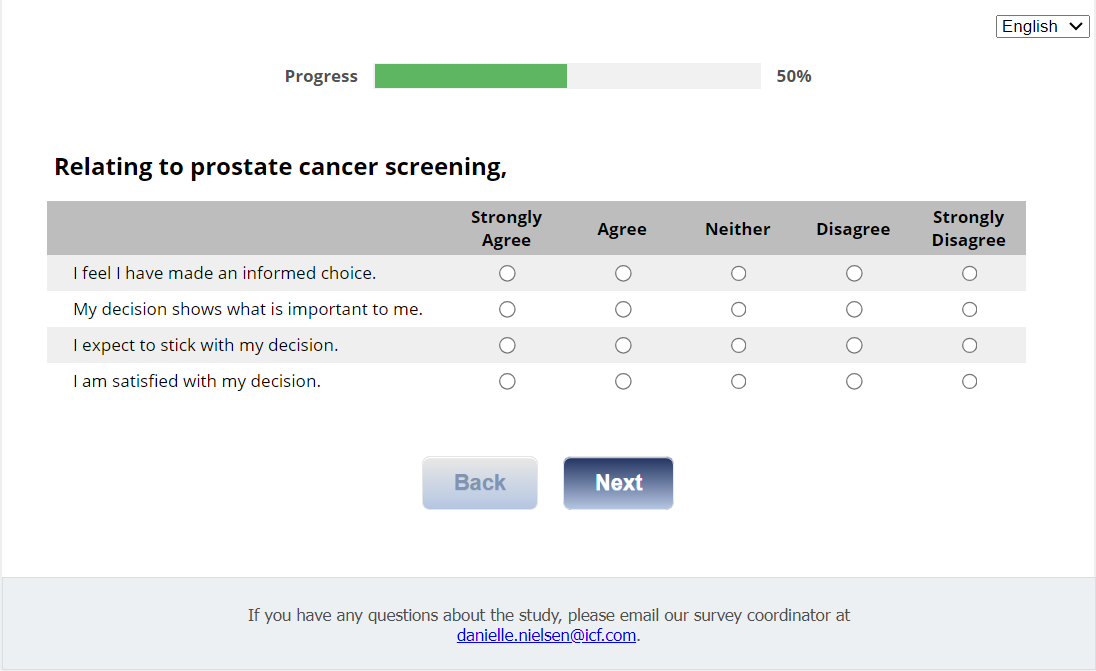
Section 3: Autonomous Decision Making
[ASK ALL]
Q37.
Please check the response that best describes how you prefer to be involved in making decisions about screening for prostate cancer.
01 I prefer to make the final decision.
02 I prefer to make the final decision after seriously considering my health care provider’s opinion.
03 I prefer that my health care provider and I share responsibility for the final decision.
04 I prefer that my health care provider makes the final decision after he/she seriously considers my opinion.
05 I prefer that my health care provider makes the final decision.
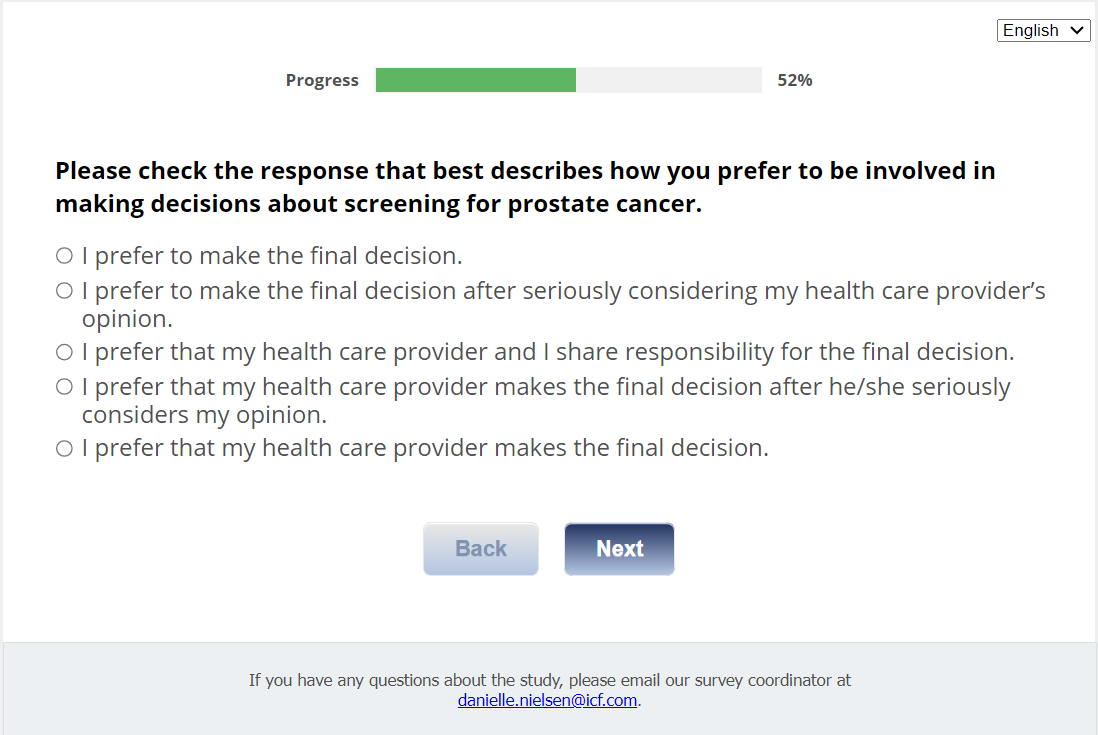
Section 4: Decision Self-Efficacy
[ASK ALL]
DSE.
For this next section, rate your confidence level for each of the statements provided as it relates to prostate cancer screening options on a scale of 0 (not at all confident) to 4 (very confident).
I feel confident that I can:
|
0 Not confident at all |
1 |
2 |
3 |
4 Very confident |
DSE1. Get the facts about the screening options available to me. |
|
|
|
|
|
DSE2. Get the facts about the benefits of each option. |
|
|
|
|
|
DSE3. Get the facts about the risks and side effects of each option. |
|
|
|
|
|
DSE4. Understand the information enough to be able to make a choice. |
|
|
|
|
|
DSE5. Ask questions without feeling dumb. |
|
|
|
|
|
DSE6. Express my concerns about each option. |
|
|
|
|
|
DSE7. Ask for advice. |
|
|
|
|
|
DSE8. Figure out the option that best suits me. |
|
|
|
|
|
DSE9. Handle unwanted pressure from others in making my choice. |
|
|
|
|
|
DSE10. Let the clinic team know what’s best for me. |
|
|
|
|
|
DSE11. Delay my decision if I feel I need more time. |
|
|
|
|
|
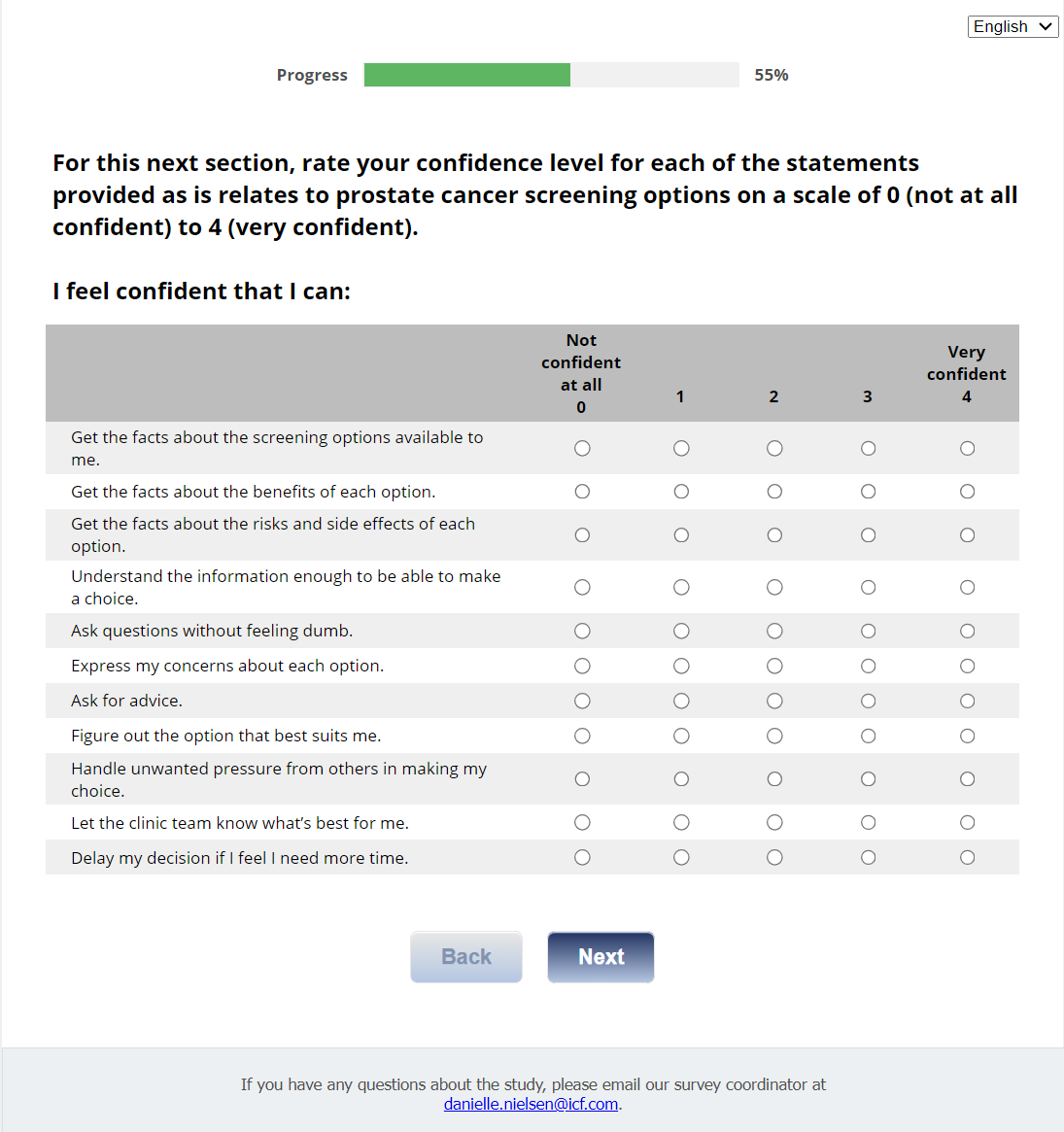
Section 5: Preparation for Decision Making
[ASK ALL]
PDM.
For this next section, please indicate your opinion about the effect of the prostate cancer screening materials you received by checking the appropriate box in each row to show the extent to which you agree with each statement. Please answer each question using either, “Not at all”, “A little”, “Somewhat”, “Quite a bit”, or “A great deal.” If you think the question is not applicable, select “N/A.” Also, if you do not have a health care provider, please select that option.
Did this education material…
|
01 Not at all |
02 A little |
03 Somewhat |
04 Quite a bit |
05 A great deal |
95 N/A |
96 I do not have a health care provider |
PDM1. Help you recognize that a decision needs to be made? |
|
|
|
|
|
|
|
PDM2. Prepare you to make a better decision? |
|
|
|
|
|
|
|
PDM3. Help you think about the pros and cons of each option? |
|
|
|
|
|
|
|
PDM4. Help you think about which pros and cons are most important? |
|
|
|
|
|
|
|
PDM5. Help you know that the decision depends on what matters most to you? |
|
|
|
|
|
|
|
PDM6. Help you organize your own thoughts about the decision? |
|
|
|
|
|
|
|
PDM7. Help you think about how involved you want to be in this decision? |
|
|
|
|
|
|
|
PDM8. Help you identify questions you want to ask your health care provider? |
|
|
|
|
|
|
|
PDM9. Prepare you to talk to your health care provider about what matters most to you? |
|
|
|
|
|
|
|
PDM10. Prepare you for a follow-up visit with your health care provider? |
|
|
|
|
|
|
|
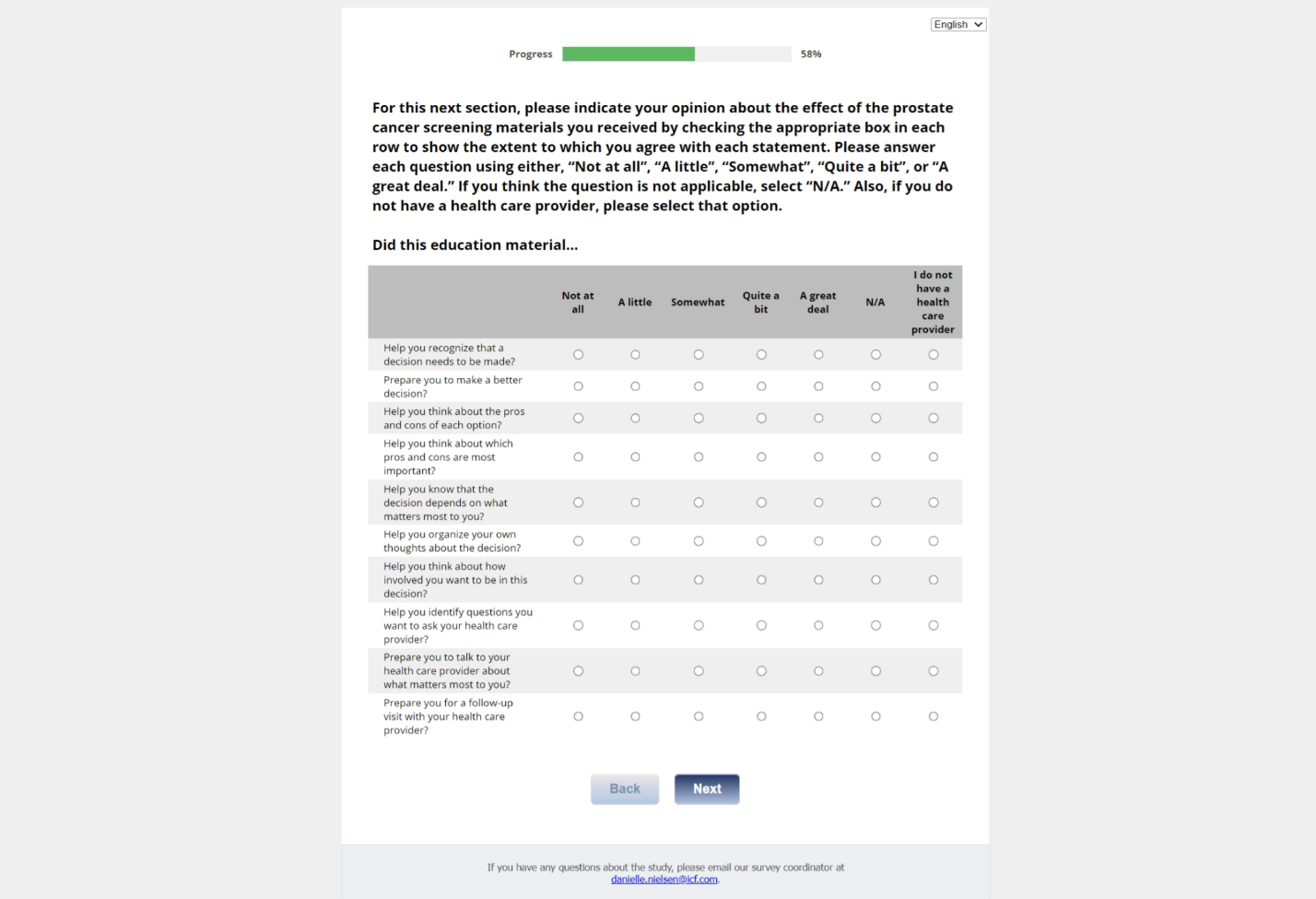
Section 6: Exposure to Assigned Material
[ASK ALL]
EXP2INT.
Had you seen or read the information on prostate cancer screening assigned to you before participating in this study?
01 Yes
02 No
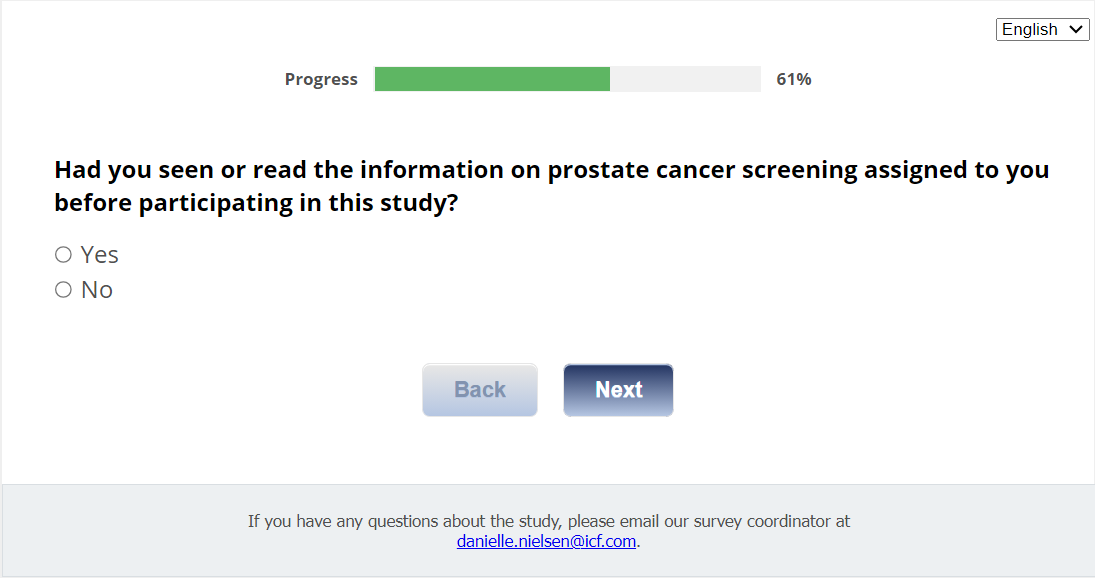
[ASK ALL]
EXP2INTb.
How much of the information on prostate cancer screening assigned to you did you review?
01 All of it
02 Some of it
03 None (please explain): [TEXT BOX] (skip to Section 8, Contamination)
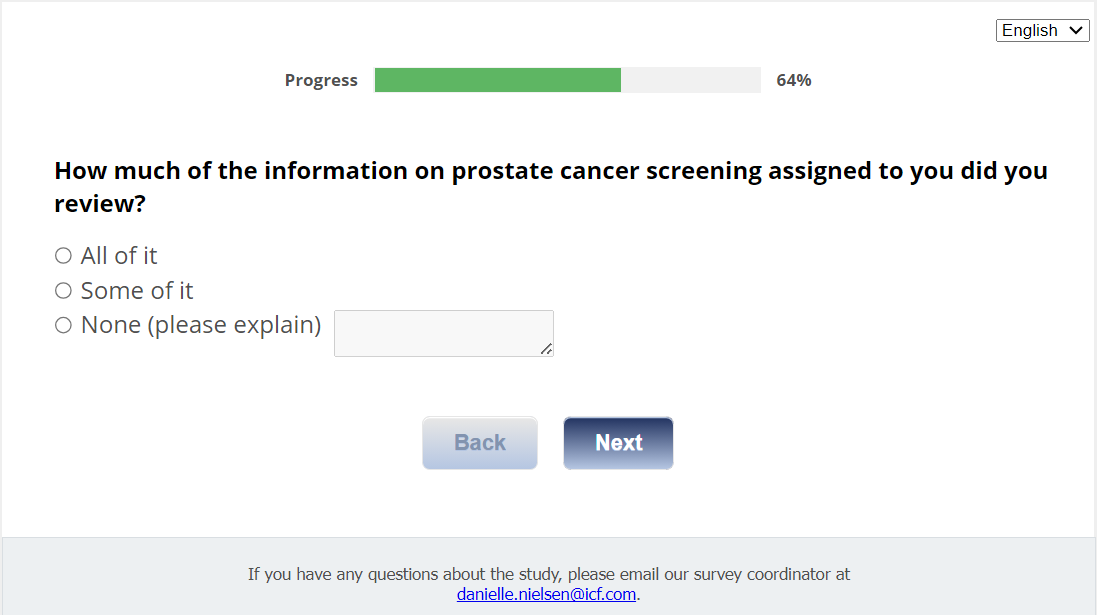
Section 7: Help Needed to Review Assigned Materials
[ASK IF EXP2INTb=01,02]
HELPREV1.
Did you ask someone to help you in reviewing the information on prostate cancer screening assigned to you?
01 Yes
02 No
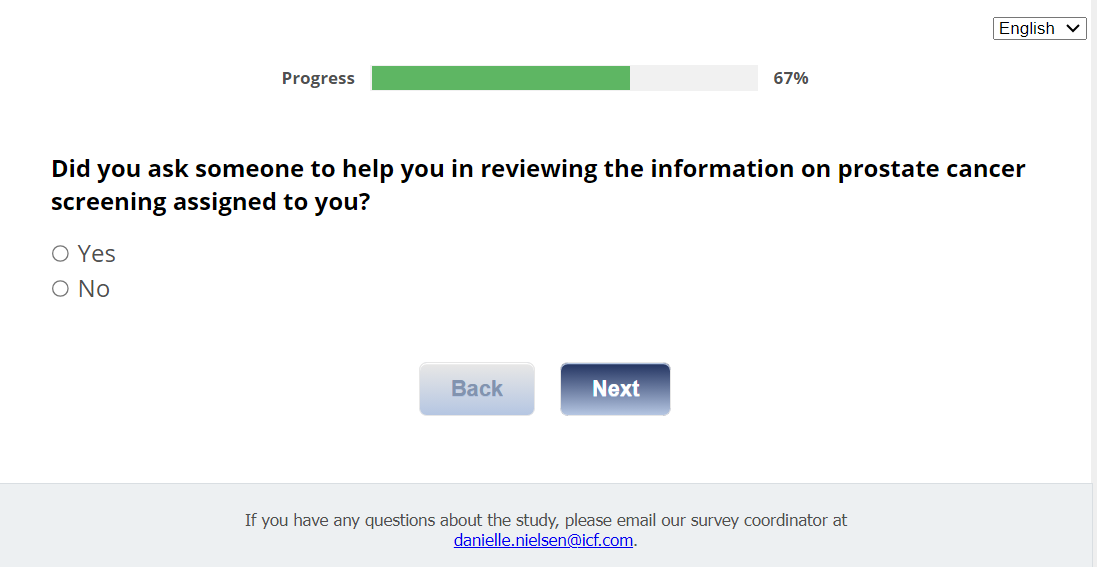
[ASK IF HELPREV1=01]
HELPREV2.
How much help did you need?
01 A lot of help
02 Some help
03 A little help
04 No help
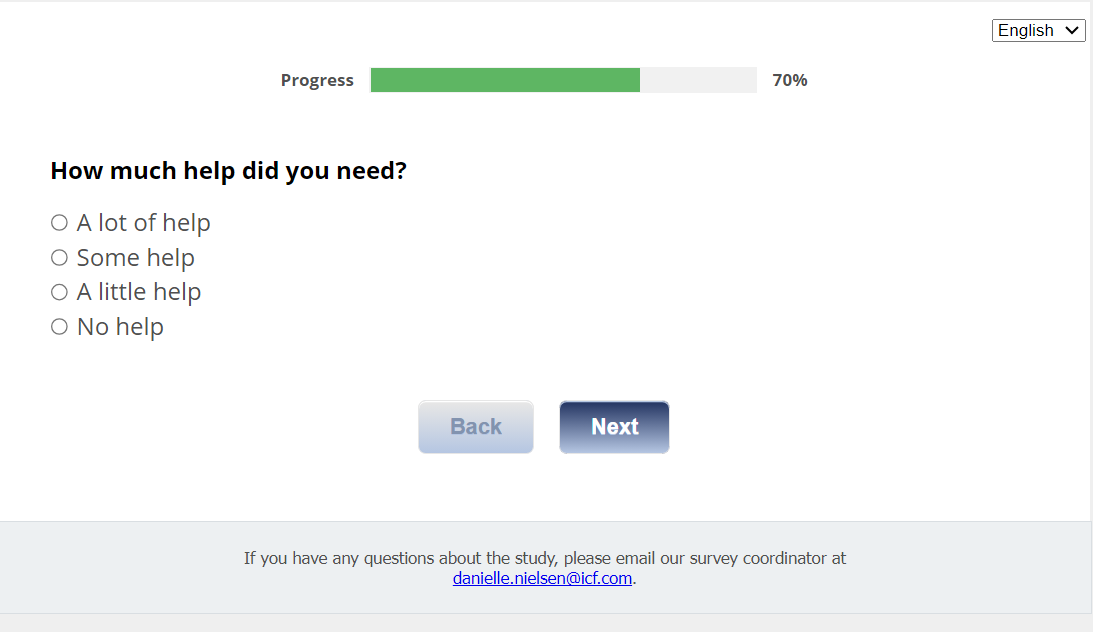
[ASK IF HELPREV1=01]
HELPREV3.
What kind of help did you need? Check all that apply.
01 Help to use the computer
02 Help to read the information
03 Help to understand the information
04 Other, specify [TEXT BOX]
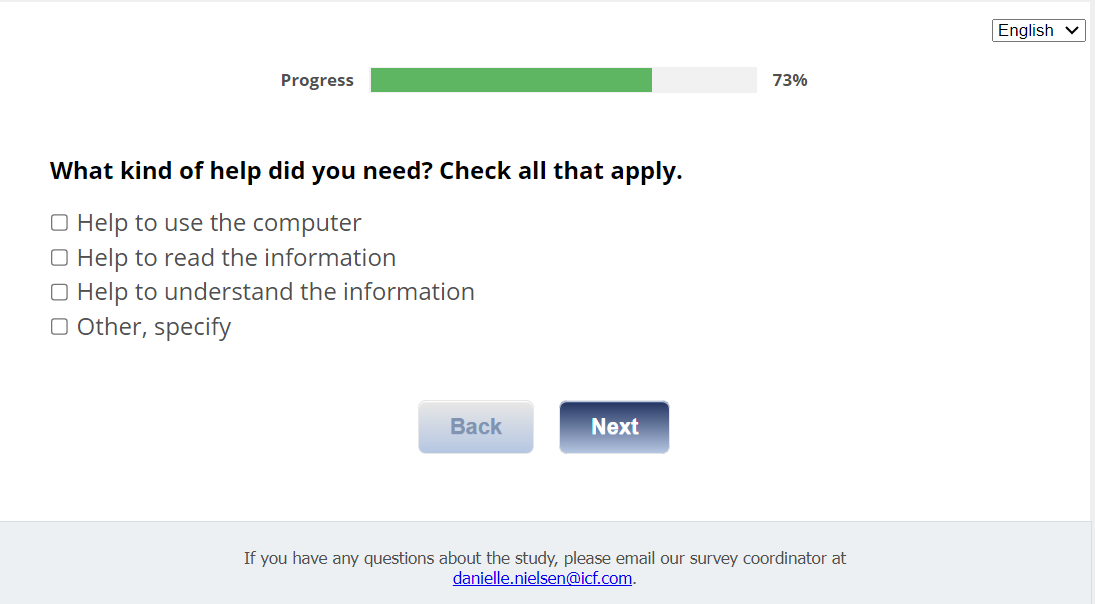
Section 8: Contamination
[ASK ALL]
CONTAM1
While participating in this study, have you reviewed any informational materials about prostate cancer screening other than those provided by the study team?
01 Yes
02 No
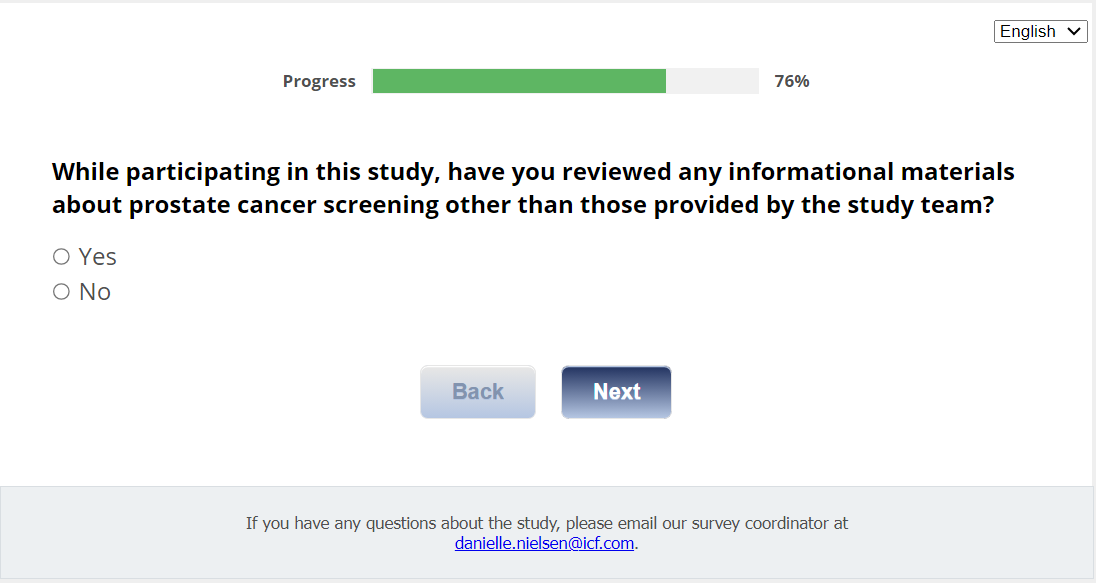
[ASK If CONTAM1=01]
CONTAM2
What informational materials about prostate cancer screening did you review?
[TEXT BOX]
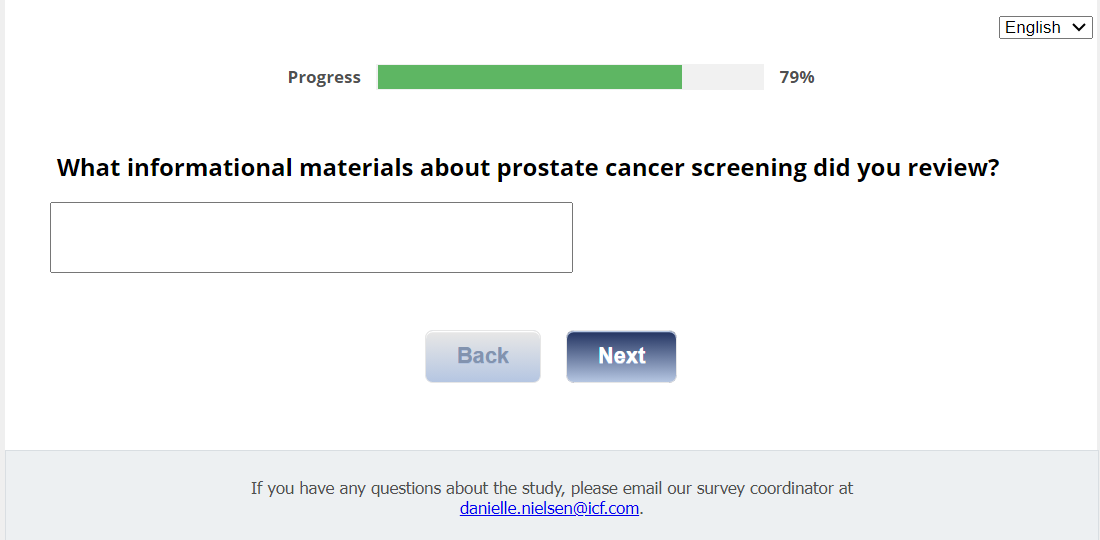
Section 9: Gift Code
[ASK ALL]
[REQUIRED]
J1int. In appreciation for the time you have spent answering our questions, we would like to give you a $25 Amazon gift code. Would you like the gift code?
01 Yes
02 No
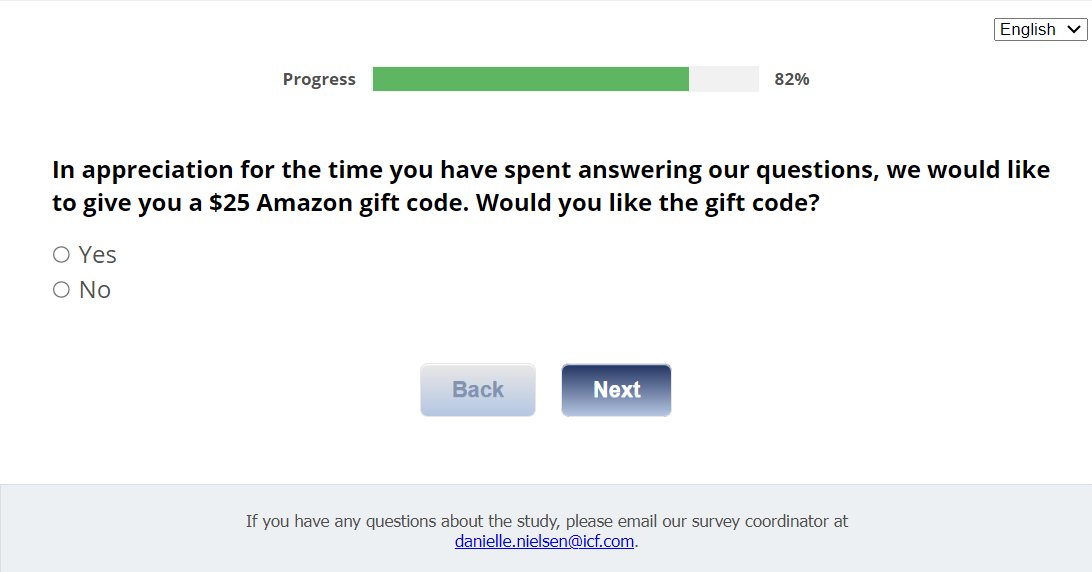
[ASK if J1int=01]
J1.
Thank you for completing this survey. Your $25 Amazon gift code is displayed below. You will also receive an email with this gift code for your records.
<insert GCODE>
The code is a unique number you can use to purchase items online at Amazon.com. You may enter the code online when you are ready to make a purchase at Amazon.com. There is no expiration date.
Also, within the next week, you will receive an email with a weblink to information about prostate cancer screening for your review. The email will also include a weblink to a survey for your completion.
If you have any questions, please contact the project manager, Danielle Nielsen at [email protected].
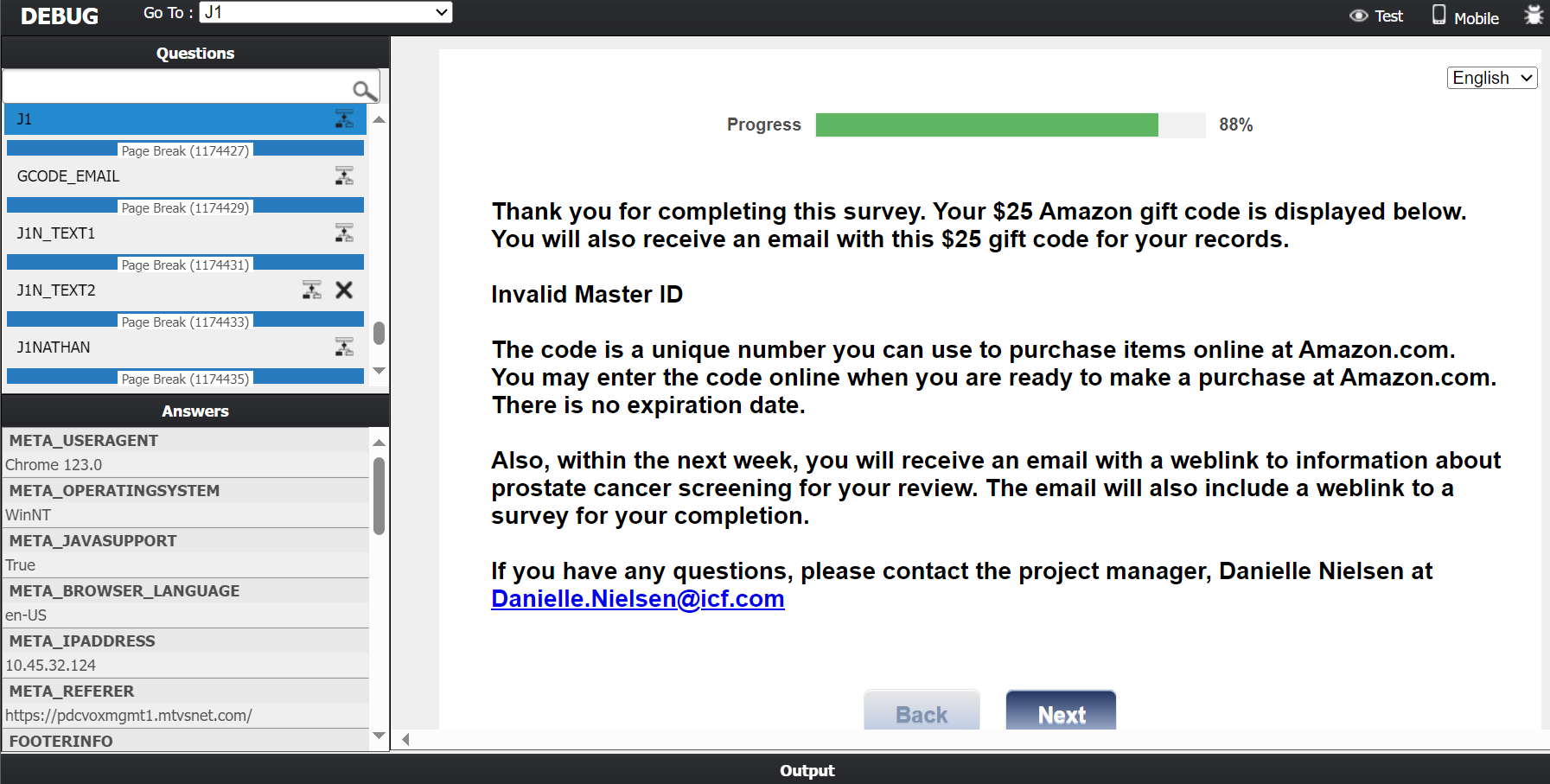
Send <gcode email> to <Email1>
To receive your code via email, please enter your email address here:
[TextBox]
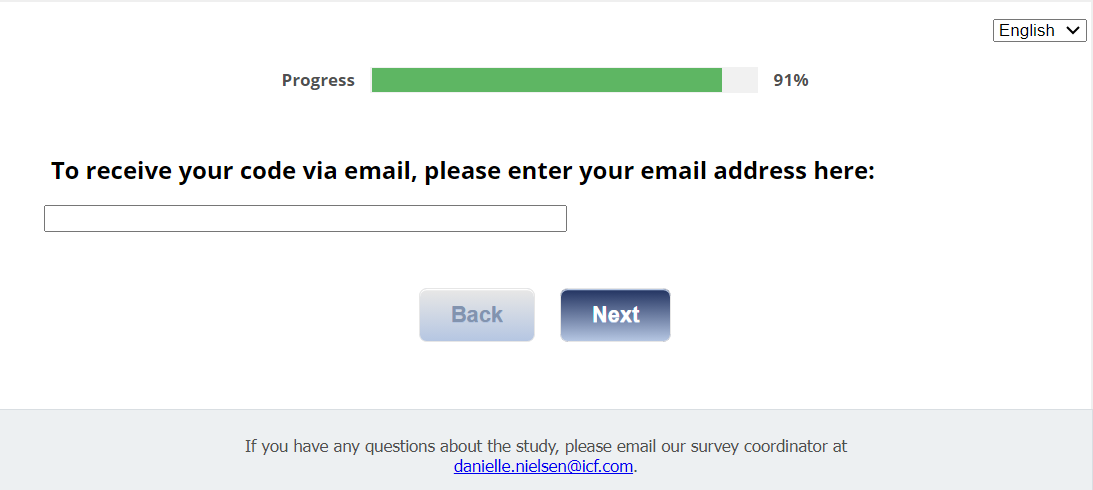
Hello!
Thank you for completing the first survey of the CDC Prostate Cancer Evaluation Study!
Here is your Amazon gift code for $25:
<GCODE>
HOW TO USE YOUR AMAZON GIFT CODE
The code is a unique number you can use to purchase items online at amazon.com. You may enter the code online when you are ready to make a purchase at amazon.com. There is no expiration date.
Save this code in a safe space until you are ready to use it. Some ideas to keep it safe are:
Write it down on a sheet of paper and keep it in a safe and hidden location.
Take a photo of the code with your phone.
Save the code in your Amazon.com account. If you have an amazon.com account, you can save your code in your account until you are ready to spend it.
Type in this link: https://www.amazon.com/gc/redeem/
Or, follow these instructions:
Go to amazon.com
In the blue banner, click on "Gift Cards & Registry"
On the gift cards page, choose "redeem a gift card"
Type or copy/paste the gift code into the "Enter claim code" field
Thank you once again for your time and feedback!
regards,
Debbie Krugipudi
CDC Prostate Evaluation Study Support Staff
For Nathan arm participants who reviewed Nathan prior to this survey (i.e., Nathan arm participants who respond “All of it” or “Some of it” to the question “How much of the information on prostate cancer screening assigned to you did you review?”):
[ASK IF EDUMAT=1]
J1NATHAN
Thank you for completing this survey.
Within the next week, we will reach out to you to request your participation in an 18-minute survey to gather your thoughts on the usability of Talk to Nathan. You will receive a $25 gift code for completing this survey.
Following completion of that survey, we may also contact you to request your participation in a 20-minute discussion about your experience in using Talk to Nathan.
If you have any questions, please contact the project manager, Danielle Nielsen at [email protected]
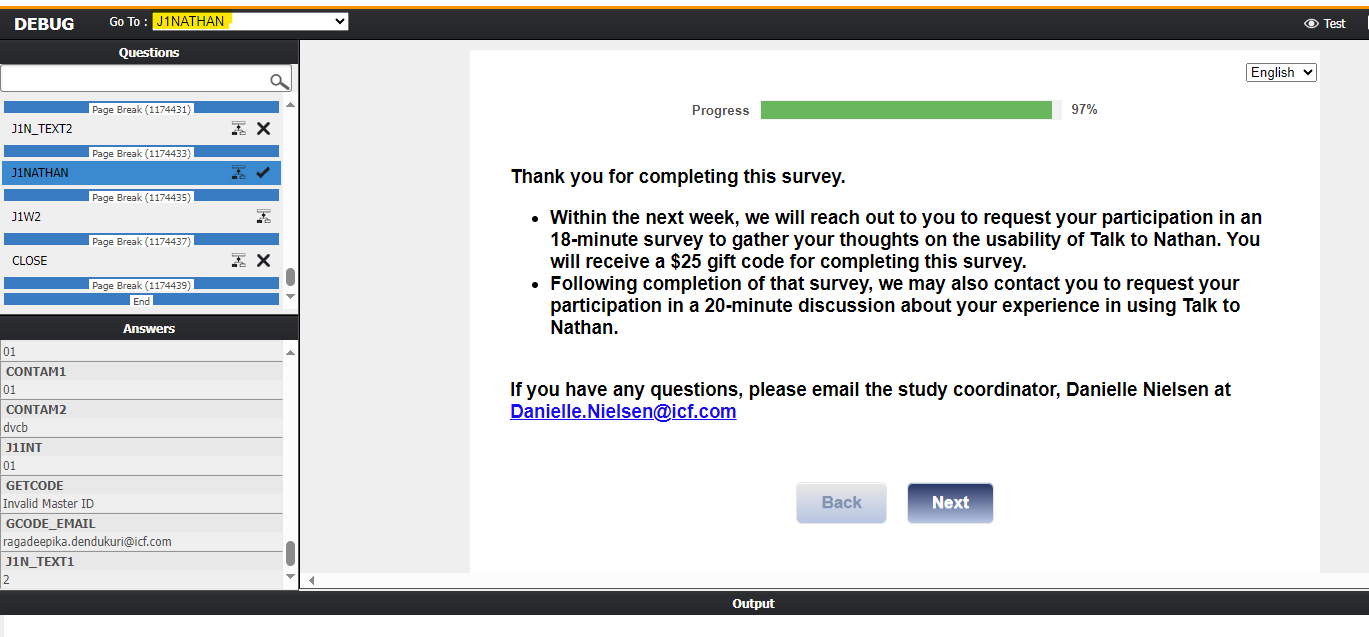
For other arms and for participants in the Nathan arm who did not review Nathan prior to this survey (i.e., Nathan arm participants who respond “None” to the question “How much of the information on prostate cancer screening assigned to you did you review?”):
[ASK IF EDUMAT=2]
J1W2
Thank you for completing this survey.
Within the next week, you will receive an email with a weblink to the final survey for this study. This survey should be completed after your visit with your health care provider on [date].
If you have any questions, please contact the project manager, Danielle Nielsen at [email protected]
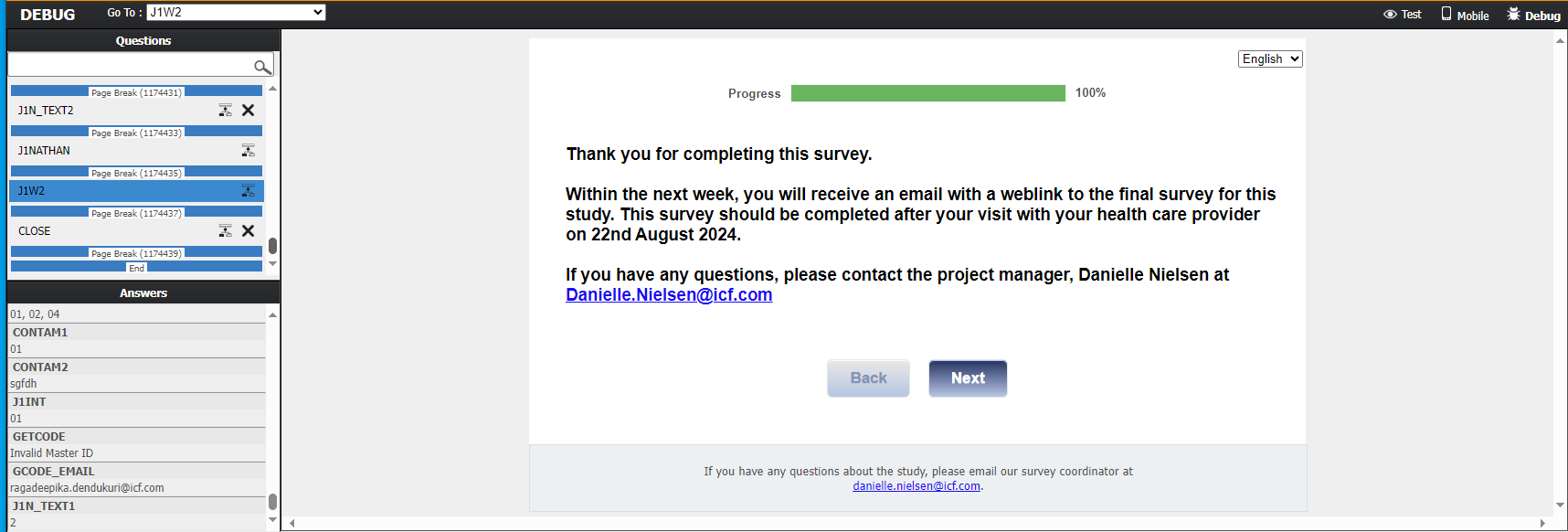
[ASK ALL]
CLOSE.
Thank you for completing this survey.
If you have additional questions, please contact our study coordinator at [email protected].

Public reporting burden of this collection of information is estimated to average 20 minutes per response, including the time for reviewing instructions, searching existing data sources, gathering and maintaining the data needed, and completing and reviewing the collection of information. An agency may not conduct or sponsor, and a person is not required to respond to a collection of information unless it displays a currently valid OMB control number. Send comments regarding this burden estimate or any other aspect of this collection of information, including suggestions for reducing this burden to CDC/ATSDR Reports Clearance Officer; 1600 Clifton Road NE, MS D-74, Atlanta, Georgia 30333; ATTN: PRA (0920-####).
| File Type | application/vnd.openxmlformats-officedocument.wordprocessingml.document |
| Author | Thomas, Cheryll C. (CDC/DDNID/NCCDPHP/DCPC) |
| File Modified | 0000-00-00 |
| File Created | 2024-09-05 |
© 2026 OMB.report | Privacy Policy